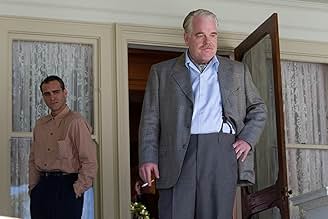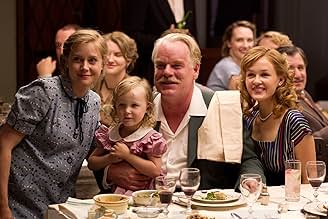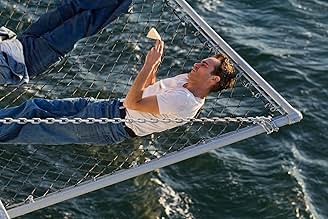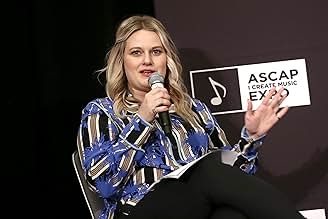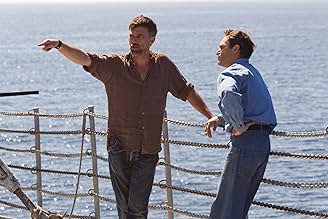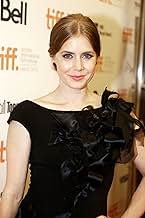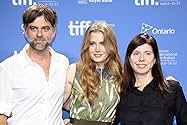Un ancien combattant de la marine rentre chez lui après la guerre, inquiet et incertain de son avenir jusqu'à ce qu'il se laisse tenter par un mouvement appelé la Cause et son chef charismat... Tout lireUn ancien combattant de la marine rentre chez lui après la guerre, inquiet et incertain de son avenir jusqu'à ce qu'il se laisse tenter par un mouvement appelé la Cause et son chef charismatique.Un ancien combattant de la marine rentre chez lui après la guerre, inquiet et incertain de son avenir jusqu'à ce qu'il se laisse tenter par un mouvement appelé la Cause et son chef charismatique.
- Director
- Writer
- Stars
- Nommé pour 3 oscars
- 75 victoires et 187 nominations au total
- V.A. Patient
- (as Patrick Biggs)
Avis en vedette
Phoenix's performance as Freddie reduces all he's done before to a preparation exercise. He longs for something, but even he can't tell you what, and that sorrow has clotted into self- destructive ritual. We see his snarly face from angles we haven't seen before. We're not sure if his leery eyes are hateful or if he's dead inside. He's a captivating animal.
Then he meets stout, articulate Lancaster Dodd, always circled by people who treat him like a prodigy, hanging on his every word, laughing at all his mugging. Lancaster fancies himself a renaissance man. He's married to Peggy, who's much more vigilant than we first think. His son trails the proceedings with a dormant pose of derision. His daughter marries a man who, like everyone else in their clique, views him as a wizard.
The film belongs to Phoenix, but Hoffman more than does his thing, his affectations ringing with conceit and fraudulence. Freddie---father dead, mother institutionalized---is naturally drawn to Dodd, who promises answers, mental freedom, happiness, even claims to cure leukemia. He's written a book his bootlickers treat as a sort of bible. He loves to charm and perform.
It's well-known that Lancaster's cult is inspired by L. Ron Hubbard's Scientology. It's not direct, but the manner in which Lancaster draws Freddie into the fold, among other things, is unmistakably influenced by the contentious institution and Hubbard's life. Paul Thomas Anderson doesn't bind to that inspiration for his movie...but he doesn't bind to anything, really. You walk out muddled, wearied, wondering where to start in connecting the dots in this elegant, arresting movie. The story is as confounding as its technique is magnificent.
Anderson, the true wunderkind of the Tarantino generation, sets everything up so beautifully, you wait for the turning point to prevail so the intrigue can come to boil. Instead, nothing progresses. The dramatic developments seem to dwindle and become less consistent as the movie drifts along, and Anderson throws in pauses, like a lingering desert scene or an outstretched montage in which Freddie is made to pace in a room, that slow the movie to a drudge. Freddie's sex preoccupation, which was stressed in the film's early stretch, grows dissonant. It's less about narrative arc and more the emotional condition of two men, a twist of trust and mistrust, id and superego. PTA's vision is grand in scope, but his result is not so much ambiguous as opaque and detached.
For the first time in his immaculate career, the greatest filmmaker of his generation seems to languish. His newfound frigidness makes the film easy to admire but difficult to love. Anderson is so stunningly impressive, in fact, that it's taken me two viewings of The Master to admit all this to myself. Understandably, some critics have patronized it as deliberately evasive and occult, but isn't that just double-talk? A glorification of an artist's failure to proportionately bear his ideas? Something particularly intriguing is how the movie poses questions not so much about the importance of faith, but how far the human limit for change can extend and to confront emotional devastation so heavy it can never recover. But the film is too ambivalent or cautious to probe them in depth. By the end, it's become an opaque challenge between two phenomenal actors whose commitment to their roles is awe-inspiring, but it's manacled to a work so in awe of itself, the audience gets blockaded.
The film is about the obsession of cult groups which try to answer life's riddles for troubled people. In this case, the group and its leader appear very loosely inspired by Scientology and L. Ron Hubbard, called "the Cause" whose leader is Lancaster Dodd (Hoffman). Although Hoffman plays the title role, the story is really about an ex-naval officer Freddie Quell (Phoenix) who is suffering from PTSD as a result of his involvement in World War II. After the war, he is a lost soul roaming through life with a series of misadventures, such as attacking a customer when he works for a department store as a photographer, or accidentally offering a poisonous drink to a migrant worker.
At his lowest point, he wakes up on board some kind of small yacht and meets a strange man, Lancaster Dodd, who informs him he's aboard his ship at Quell's request, although our protagonist can't remember having boarded. Quell learns about Dodd at their first meeting who states "I am a writer, a doctor, a nuclear physicist and a theoretical philosopher, but above all, I am a man, a hopelessly inquisitive man, just like you." He also says people attack him for his "dangerous" ideas. Slowly, Quell learns that Dodd is head of some kind of an underground movement combining philosophy and pseudo-science and publishes books on some far-fetched ideas which probably have no scientific basis. Dodd is often referred to as simply "Master" by members of this group. Dodd and his group believe the way to "heal" troubled people is by cleansing their souls through a hypnotic process which attempts to heal injuries inflicted during past lives.
Probably the most compelling part of the film is the first half, where we as the audience learn about Dodd and the Cause through the eyes of Quell. The most captivating moment is when Dodd is accused of not only illegally accepting a large donation from a philanthropist through a foundation, but practicing medicine without a license. I thought the film would focus on these accusations, but then the film leaves these indictments far behind. Afterwards, the film meanders, a bit like Quell at the beginning. The film becomes an episodic montage of interesting moments which are rather disconnected. By film's end, I didn't feel much more was revealed about Dodd and his Cause than when Quell first joined during the first third of the film.
Although all the acting is right on the money including outstanding performances by Hoffman and Phoenix, and the script dialog was absolutely true the characters, the entire film was kind of dissatisfying. We as the audience are given hints of the politics of Dodd and his inner circle but often these ideas are never fully developed. Also, much screen time was devoted to many of the "past life" sessions conducted by Dodd, but I think at some point it became wasted screen time. After 3 or 4 sessions, I pretty much understood the idea but instead countless others are offered without giving much insight into Dodd and who he is. By film's end, "The Master" was more like a character study than a story. A noble effort that wasn't quite there for me.
**** (out of 4)
Paul Thomas Anderson's latest centers on Freddie Quell (Joaquin Phoenix), a trouble man who after serving in WWII finds himself wondering around, getting addicted to alcohol and not really having a place in life. This is when he comes across a man some call The Master (Philip Seymour Hoffman) who begins to make him see life in a different way. THE MASTER is pretty much about L. Ron Hubbard and Scientology but I'm sure for legal reasons this isn't ever really spelled out. I will admit that I hated MAGNOLIA but found both BOOGIE NIGHTS and THERE WILL BE BLOOD to be extremely good movies even if I didn't love them like most people did. This film here is without question the greatest of the director's career and it's rather amazing to watch because of how slow it moves. I'm not saying it's slow in a bad way, instead the director really takes his time letting the viewer get to know the characters and before long you're really wrapped up in what's going on and can't turn away. I'm sure many people are going to want to read into what's going on. I'm sure many people will be coming to the film just to bash Scientology. For me this film really doesn't take a stand one way or another but instead it gives us a couple of the most memorable characters in recent years and their journey is something quite chilling and downright impossible to ignore. Of course, one of the greatest benefits is that you've got two of the best actors working together and performing magic. Phoenix has always been an underrated actor and this here might be the best performance of his career. There are so many sides and emotions to this character yet Phoenix reaches all of them without a problem and is downright haunting during certain scenes. Even his rages of anger are downright chilling. Hoffman, who seems to be doing one masterpiece job after another, also delivers here. I really enjoyed how un-flashy he made the character and I really liked that he didn't just scream like a maniac. There's certainly some very funny screaming matches but the way Hoffman builds up to these moments is just magical to watch. Amy Adams does a very good job in her supporting role but I think there's no doubt that the film belongs to the two leads. Jonny Greenwood's music score really grabs you from the first time you hear it and it perfectly fits with what's going on in the film. The cinematography by Mihai Malaimare, Jr. is downright masterful and the use of 70mm is something I thought wouldn't work in a film like this but the visual look it gives the film shows that it was the right choice. THE MASTER probably won't appeal to everyone but even if you don't like the subject, the two performances are just so great that this is still a must see picture.
Inspired by Scientology founder L. Ron Hubbard and the development of a cult, 'The Master' is a drama-piece through and through.
The movie doesn't have a message or goal as such and sort of does it's own thing.
The things worth watching are the terrific performances, weird content and some very fine cinematography.
Le saviez-vous
- AnecdotesDuring the jail cell scene, Joaquin Phoenix breaks a real toilet. His actions were entirely improvised. Due to the historical past of the building where the scene took place, the toilet was considered "historical." Joaquin had no intentions to break the toilet, nor did he think it was possible.
- GaffesIn the "pacing" scene, as Quell goes from wooden paneled wall to window and back, the second time he goes to he wooden paneling, he breaks out a panel when he pounds it with rage. In the numerous successive shots, the wood panel is restored.
- Citations
Lancaster Dodd: If you figure a way to live without serving a master, any master, then let the rest of us know, will you? For you'd be the first person in the history of the world.
- Générique farfeluAfter its title, this film has no further opening credits.
- ConnexionsEdited into Conspiracy: The Hollywood Syndicate (2015)
- Bandes originalesBaton Sparks
From '48 Reponses to Polymorphia'
Written by Jonny Greenwood
Performed by The Aukso Chamber Orchestra
Courtesy of Unreliable Ltd.
Meilleurs choix
Détails
- Date de sortie
- Pays d’origine
- Langues
- Aussi connu sous le nom de
- The Master
- Lieux de tournage
- Mare Island, Vallejo, Californie, États-Unis(as Philadelphia, Pennsylvania and various houses, a park and the docks)
- sociétés de production
- Consultez plus de crédits d'entreprise sur IMDbPro
Box-office
- Budget
- 32 000 000 $ US (estimation)
- Brut – États-Unis et Canada
- 16 377 274 $ US
- Fin de semaine d'ouverture – États-Unis et Canada
- 736 311 $ US
- 16 sept. 2012
- Brut – à l'échelle mondiale
- 28 689 359 $ US
- Durée2 heures 18 minutes
- Couleur
- Mixage
- Rapport de forme
- 1.85 : 1







